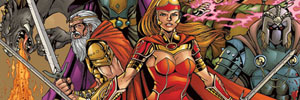# 3 The Gracious Lady
The Gracious Lady is neither gracious or a lady. Not in the strict sense of the word, and is barely one in the loosest. No, her name is a title and a poor one at that. It is what others call her in hopes of her getting the hint.
That has yet to occur.
The Gracious Lady was once called the Monster of Towers until the Great War came. As far as the individual battles went, it was a fairly standard war, but it was long and costly. So much so that eventually people turned to her to end the war. Well, the Imperator turned to her to end the war by any means necessary, and that was enough to set her loose upon the world.
(It was not, in fact, she herself who ended the War but her Conduit. But she powers it, controls it, and is the reason it exists at all, so she can call you out on that technicality.)
(It is also for the same role in ending the War that some call the Gracious Lady by another name: Saros, Destroyer of All. She likes this name much more, to be honest.)
Now, nothing can be done without payment, nothing can happen without cost. The careful, delicate balance of giving and receiving must be maintained at all costs. The price for ending the War held a steep price indeed, one to be born by all who benefited most by its end. So that meant the entire land would bear the burden of payment and not just the royals. There wasn’t much rejoicing about that. What was this price, though?
A Consort for the Towers.
At first the people assumed that the Consort had to be a boy, handsome and young, most preferably the youngest son of many, because stories love people like that and what better way to defeat a monster than with a story. Then, during the time of the Fifth Son and the one hundredth anniversary since the end of the war – when all tales surrounding it had started to pass into myth and legend – the aforementioned Fifth Son, a boy beautiful in body (because once again, stories favoured the beautiful), was sent home with his handsome head impaled on a spike and a message on his lips. One of the Gracious Lady’s favourite things is to use the dead as her messengers.
“Try again,” spoke dead, bloodied lips, and then a new tradition was born: A Consort would be sent, and if he was unacceptable, the Gracious Lady would return him. In pieces.
Again and again, son after son would return home to the funerary pyres. Whatever it was the Gracious Lady was looking for in a Consort was never clear, what role they were to fill a mystery. Some theorized that she was looking for a Lover Reborn. Some thought she was cursed, searching endlessly for one who could break it. Most believed she discarded the boys when they ceased to amuse her.
Centuries after the end of the war, Nations should have moved on but couldn’t. Seven shining, pearly white spires pierce the heavens. In these towers, through a door which is never seen, young boys enter alive and leave dead, the words of the Gracious Lady, who had turned earth into fire and blood into poison and flesh into dust, upon their lips:
“Try again.”











This is really well written and interesting. Great job!